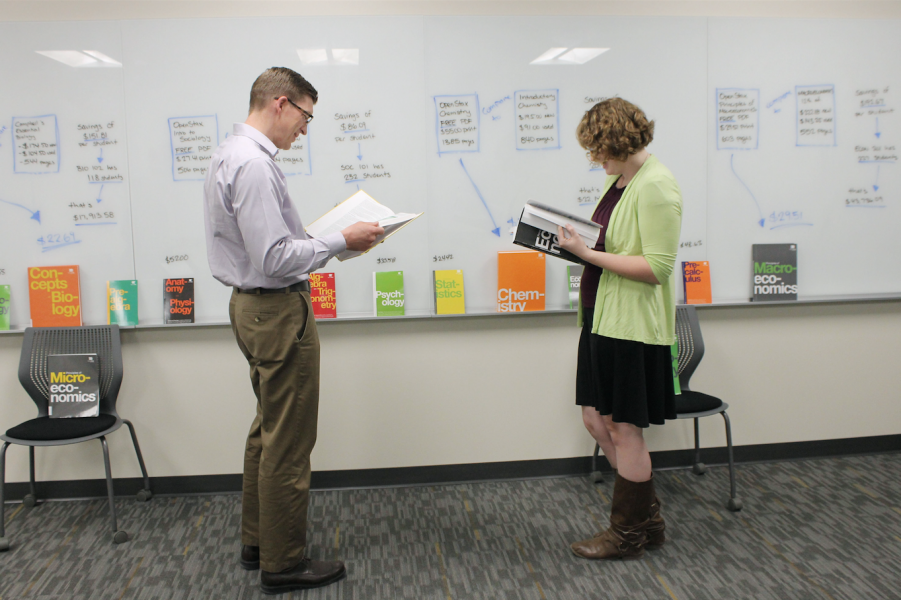With the beginning of every new semester, one thing never seems to change – college textbooks are expensive, heavy, mostly required and often useless.
At the University of Idaho, many are trying to do their part to ease that burden and Open Education Week is an attempt to demonstrate that.
ASUI President Max Cowan said signing onto a partnership with OpenStax is one step forward the university has made this semester.

Diamond Koloski | The Argonaut
University Libraries Associate Dean Ben Hunter (left) and Scholarly Communications employee Annie Gaines (right) read OpenStax’s books as part of Open Education Week’s “Textbook Petting Zoo” in the library Monday.
“OpenStax is a collaboration with Rice University that does an incredible job of producing introductory level open educational resources,” Cowan said.
UI librarian Annie Gaines said the partnership with OpenStax provides UI with marketing tools, expertise and guidance, while UI agrees to continue efforts to get faculty members to use open textbooks in their courses.
She said OpenStax currently has 19 introductory-level textbooks available online for free with the option to purchase a printed version for a low cost.
“A lot of people in the library try to be advocates for students and for education,” said Evan Williamson, digital infrastructure librarian. “We think this is a really good cause that fits in with the values and ideals of the library, including trying to come up with ways that enable high quality education at UI.”
Williamson explained that as it stands, universities pay professors, as part of their jobs, to contribute to what becomes a textbook. It is then reviewed by several other professors, given to a publishing company, and sold back to the students of those universities.
“Hopefully, one of the things going forward with open textbooks is that professors are going to get a lot more credit for creating an open textbook as opposed to traditional textbooks so people will see this as something that makes a big impact,” Williamson said.
He said students aren”t the only people who benefit from open textbooks.
“It”s not just because its cheap for students, but the faculty and administration should be looking at it and saying, “We could make a big impact on education by not outsourcing this to a publisher and putting this into an open license version that can be reused and distributed for free,”” Williamson said.
Cowan said public libraries are as far as one has to look for an example of reliable information that is free and publicly accessible.
“This idea of free access for the purpose of knowledge and bettering our society, is one that is engrained in many of our educational institutions and in many parts of our society,” Cowan said.
Although it will take a significant amount of time for faculty to switch over all their course materials, Gaines said it is worth the effort and will help improve the quality of the material.
Cowan said as a chemistry major who has bought his fair share of textbooks, he was impressed by the OpenStax version of an introductory chemistry book.
“The OpenStax version I think is of better quality than that of any other textbook I”ve ever had to purchase,” Cowan said.
Williamson said the open textbooks go through the same creation and revision processes as traditional textbooks – the only difference is they are licensed differently.
Cowan said not only can faculty download the textbooks, they can also alter the material as they see fit and add or subtract whatever they want to. He said this means if a professor has a particular lecture that they”re fond of that they think needs extra explanation or practice problems, they can tailor the textbook to that.
“Due to that freedom, the textbook becomes a true roadmap for your course, rather than an ancillary piece of the education where many parts are unnecessary,” Cowan said.
Gaines said this movement toward adopting open textbooks begins with professors who choose to use them in their introductory classes.
“Still, some professors have perfectly valid reasons for why they don”t want to adopt open textbooks,” Gaines said. “I really can”t argue with that.”
Deborah Thorne, associate professor of sociology said she has decided not to incorporate open textbooks into her Introduction to Sociology (SOC 101) course.
“I think that the concern about textbooks is legitimate, it”s gotten out of hand,” Thorne said. “I”ve currently been using a small paperback book that is quite non-traditional type text, but it”s 80 bucks and I just find that disgusting.”
Yet she said while she doesn”t think there is anything wrong with OpenStax”s version, she doesn”t like the standard textbook. She said that”s why she”s made the decision not to use either a major publisher”s traditional textbook or the open version.
“I”ve talked with enough students, and they just do not read their textbooks,” Thorne said. “My feeling is students have enough to do without all of the extra busywork in these textbooks.”
She said she can”t speak to the effectiveness of textbooks in other disciplines, but in her field, normal approaches aren”t enough.
“Faculty don”t have to adopt open textbooks, however I think if there is an open textbook available for the subject matter being taught, they are doing a disservice to their students by not considering that option,” Cowan said. “I think at the moment, very few professors are looking at, reading through and thinking about these open educational resources.”
Diamond Koloski can be reached at [email protected] or on Twitter @diamond_uidaho